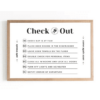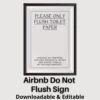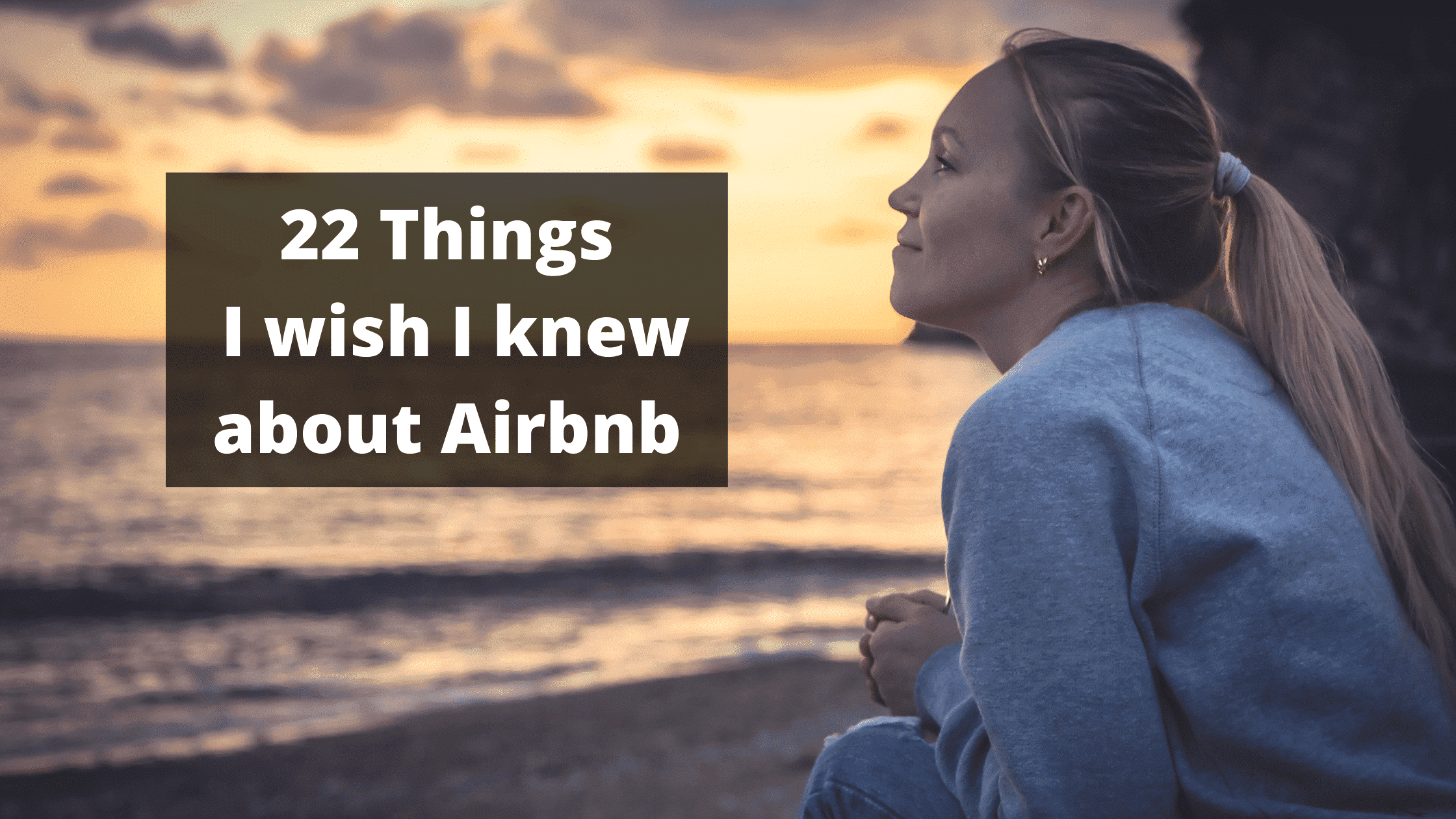
Starting hosting on Airbnb is the best choice I have ever made. But in the absence of profound insight, about how does Airbnb work, it wasn’t a smooth beginning, and my learning was rather long and expensive.
In this easy to understand guide, I have listed some beneficial things that you need to be aware of before listing your property on Airbnb.
You will learn some key aspects, which you must consider before becoming a host on Airbnb.
Why do you need this?
When I first started on Airbnb in 2015, I had no idea about what it involves and had a mountain of doubts in my mind. Also, most importantly, I wanted to know the risks involved.
I spent ages reading everything I could find on online forums and spoke to various people I knew who had experience with Airbnb hosting, but not all feedback was adequate, and I was left with many doubts.
Four years down the line, after managing 4,500 guest check-ins in 110 properties, I can look back on all those doubts I had, and the unsatisfactory advice I received, I can talk a lot about it now.
- Airbnb charges 3% from the host and 12-15% from a guest of the total booking price.
- Airbnb Review Rating: 5-star Is Good, 4-star Is Very Bad.
- Airbnb has four cancellation policies (not three).
- Airbnb allows you to charge a cleaning fee to the guest.
- You should not let a rented property on Airbnb without landlord’s permission.
- Just listing your property won’t get you bookings (for long).
- You CANNOT get rid of a bad review on Airbnb.
- You can choose who gets to stay in your property, but it comes at a price.
- Almost every guest will ask for an early check in and late checkout.
- Airbnb can kick you off the platform anytime if you violate any terms and conditions, and they will not shy away from relocating your guests.
- If you store personal items in the property, guests will poke them.
- A guest may try to take advantage if you are extra nice, so learn to say ‘No’.
- Don’t communicate with guests outside the Airbnb platform unless it’s an emergency.
- Try not to fall in the rookie trap of providing extras like wine, transport, etc.
- Minimise communication from Day One- stick instructions on everything.
- Keep a secret key somewhere close to the entry.
- Keep extra supplies in a storage with a combination lock on it.
- Suggest third party service providers but don’t arrange it for them.
- Your biggest enemy can be the ‘Amazing’ photos of your property.
- The amenities you provide decide the kind of guests you will get.
- If you have sensitive neighbours, inform your guests well in advance.
- Keep it insect and rodent free.
1. How does Airbnb work: It takes 3% from the host and 12-15% from a guest
For every booking made on the platform, Airbnb charges a fee to both the parties.
For example, if you sell a room for $100 a night, broadly speaking*, the guest will be paying $113 to Airbnb (+13% platform fee added on top), and you get paid $97 (-3% service fee).
For guests
The platform fee varies between 6-15%, based on the booking value and country. The higher the booking value lower is the Airbnb fee.
For hosts
It is a fixed 3% (of the booking total) service fee. This includes payment processing charges, property damage protection insurance of up to $1 million and providing the platform services to you.
Why is this important to know?
➤ When deciding the nightly price, keep in mind that the guest will be paying 15% in addition to the night rate (plus cleaning fee for Airbnb if any).
➤ If a guest requests a cancellation after 24 hours of initial booking, Airbnb does not return the 15% platform fee. Which means although the flexible cancellation policy states that the guests will get a full refund on cancellation, they do not get this 15% back.
Keep this in mind when deciding cancellation policy for your listing.
2. How Does Airbnb Work: 5-star Is Good, 4-star is bad
In my quest for how does Airbnb work, I soon realised, the most significant factor that impacts your search ranking and thereby your chances of getting future bookings is how the guests review your listing on Airbnb.
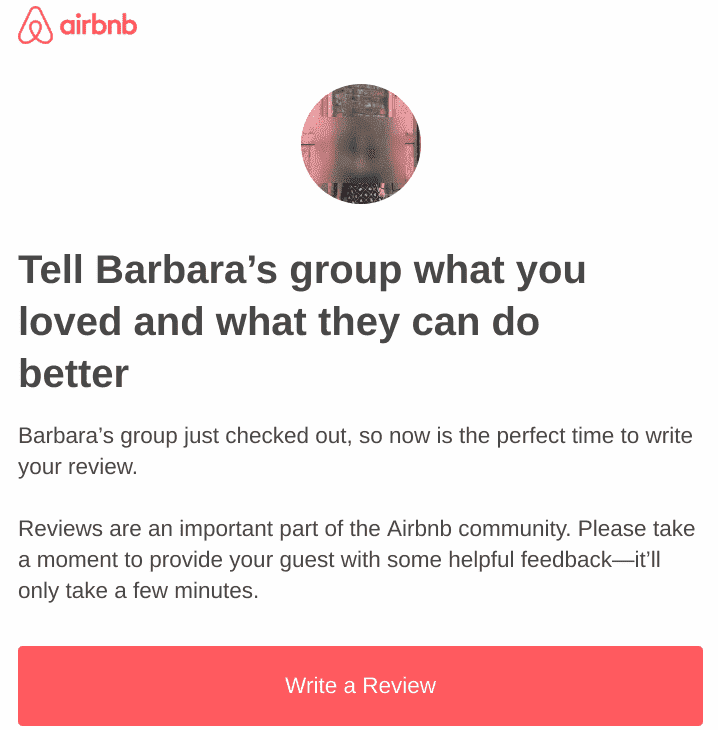
- Reviews become public immediately after both parties have written a review for each other. (Airbnb review example)
- Both, the guest and the host, have 14 days to write a review. After this period is over, it is impossible to write a review, and whoever has written the review within this period, it becomes public.
In the world of Airbnb, a 5-star review means 'excellent' whereas a 4-star review means 'bad' and with every lousy rating your bookings will slow down - that's their way of punishing you for getting 4-stars.
On a scale of 5 stars, the guests get to rate the property on six subcategories and one overall rating.
Subcategories are:
- Accuracy
- Check in
- Cleanliness
- Communication
- Location
- Value
The most important rating is the overall rating.
This is how a perfect 5-star review by a guest looks on Airbnb (I have 500 of those).
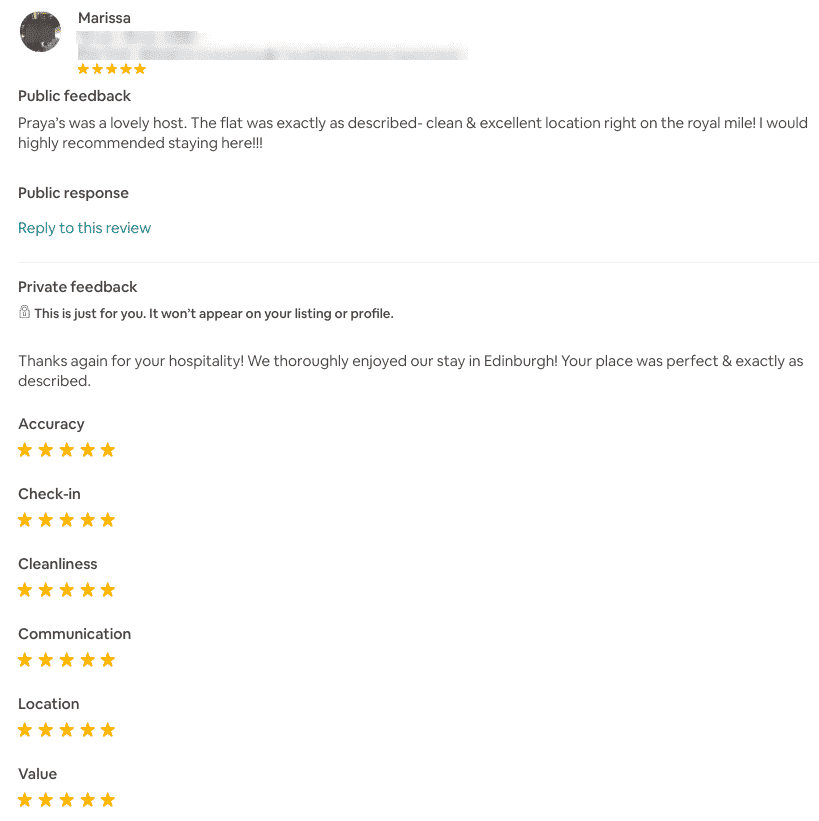
Pro Tip: After three guest reviews, the average overall star rating will start appearing on your listing. From this point onwards, Airbnb will permanently remove your property from the website if your overall star rating falls below 4.7 stars at any point. Unfortunately, that’s how it works on Airbnb.
3. Airbnb has four cancellation policies (not three).
When creating a listing, you can select one of the three standard Airbnb cancellation policies.
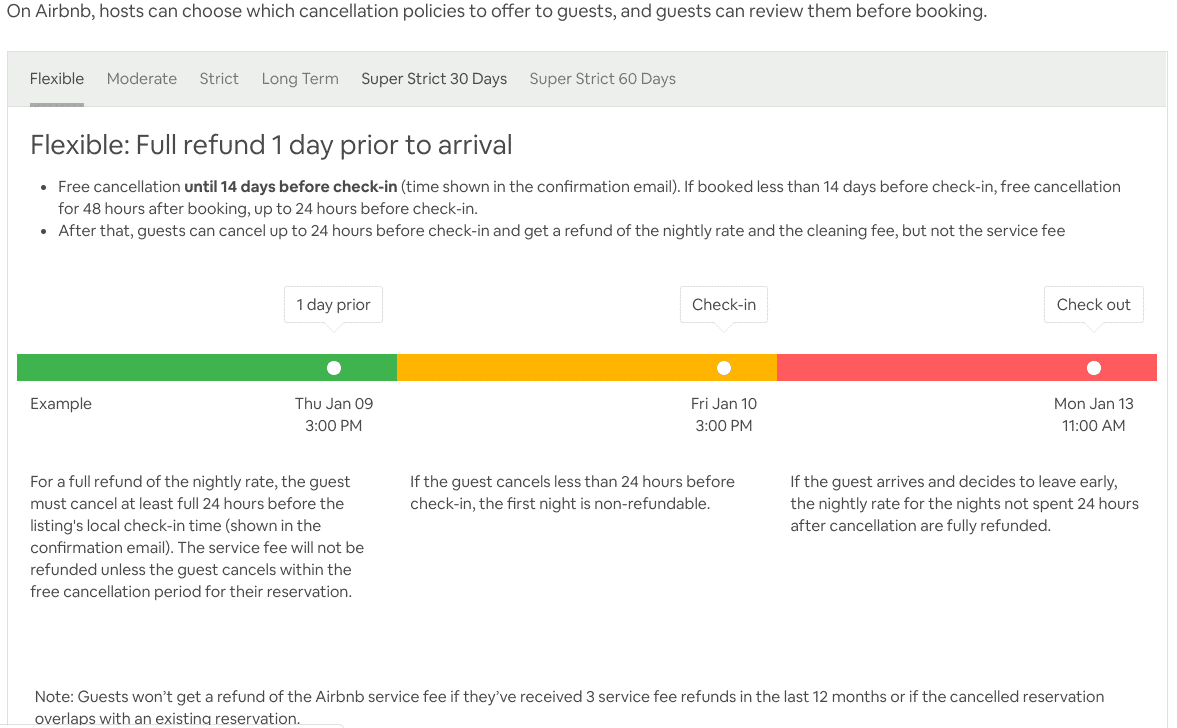
- Strict – Full refund for cancellations made within 48 hours of booking, if the check-in date is at least 14 days away. 50% refund for cancellations made at least seven days before check-in. No refunds for cancellations made within seven days of check-in.
- Moderate – Full refund five days before arrival.
- Flexible – Full refund for cancellations made within 48 hours of booking, if the check-in date is at least 14 days away. 50% refund for cancellations made at least seven days before check-in. No refunds for cancellations made within seven days of check-in.
- Long Term – Applies to all reservations of 28 nights or more. The first month is not refundable, 30-day notice for cancellation is needed.
➤ For the first three policies, the Airbnb service fee is refundable up to 3 times per year if the guest cancels within 48 hours of booking, and at least 24 hours before check-in. It isn’t refundable if the guest cancels a reservation that overlaps with any part of an existing reservation.
➤ All these policies can be superseded by Airbnb extenuating circumstances policy.
Pro Tip: Airbnb service fee is non-refundable after 48 hours of booking, reducing the chances of someone misusing the two relaxed cancellation policies, i.e. moderate and flexible.
In the beginning, I suggest keeping ‘flexible’ cancellation policy to attract bookings and move to ‘moderate’ once you have a decent occupancy rate.
Airbnb is experimenting with two more specific cancellation policies, but they are currently by invitation only and in specific locations only.
Super Strict 30 Days – 50% refund up until 30 days before arrival
Super Strict 60 Days – 50% refund up until 60 days before arrival
4. You can charge a cleaning fee to the guest.
Cleaning up after each guest is the least exciting part of hosting on Airbnb – but you can charge a cleaning fee per stay for cleaning after the guest leaves.
For example, I sell a room for $100/night and charge $35 cleaning fee to each booking which includes $20 cleaning fee and $15 for providing fresh sheets and towels etc. at the start of the stay.
I recommend keeping the cleaning fee at its actual cost. Have a look around to check how much the other Airbnb hosts are charging in your area and keep it within the same range.
More time you spend learning about how does Airbnb work and pricing in your area, more competitive you will stay for long.
5. You should not let a rented property on Airbnb without landlord's permission.
Airbnb doesn’t validate if you own the property or not, but you are exposing yourself to substantial liability risks if you sublet a rented property on Airbnb.
Even if you rent a property and wish to share a room or rent the entire property occasionally – you should take written permission from your landlord.
On the other hand, if you are looking for rent-to-rent a property on Airbnb, the standard lease/rental agreement with a sublet clause from the landlord is not sufficient.
You should get a contract (See Airbnb Rental Agreement Template) to cover you against potential risks that come with letting it to strangers on Airbnb.
It is also worth checking if planning permission for Airbnb is needed in your city.
6. Just listing your property on Airbnb won't get you bookings (for long).
With the exponential growth of Airbnb over the last few years, more and more property owners are now marketing their property on the platform.
For example, Edinburgh Scotland had 8 Airbnbs in 2009 as compared to a staggering 12,000 in 2018.
A similar trend is prominent in all major cities across the globe where Airbnb is allowed to operate.
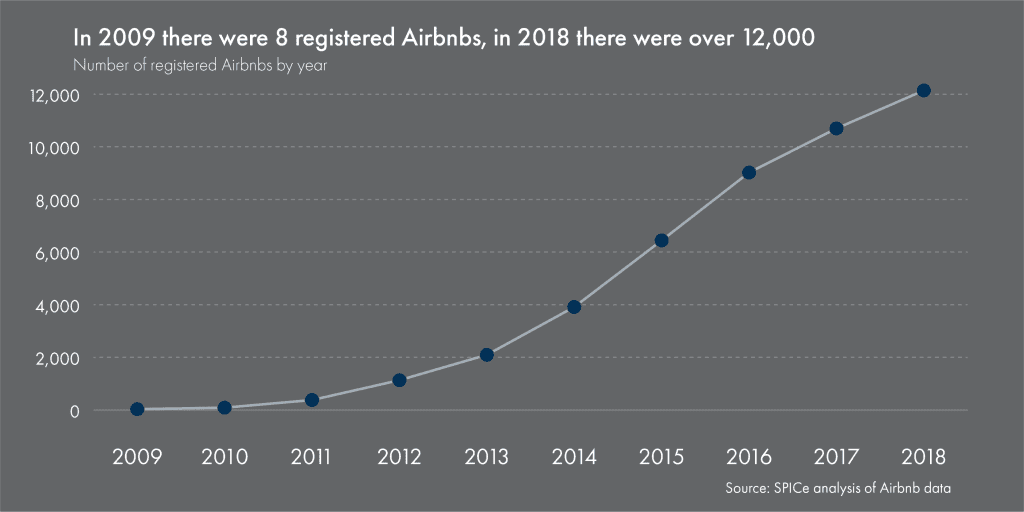
At the same time, Airbnb is continually evolving its website to show the most relevant and the best performing properties to the travellers matching the search criteria entered by them.
With hundreds of properties available for Airbnb to show to the users -for property owners, it has become a race to stay in the first two pages of as many search criteria as possible.
Now, the biggest question is how Airbnb algorithm chooses a property to show on the first few pages of a search result? The truth is – no one knows how it works at Airbnb.
Airbnb will never reveal its algorithm, and it’s their best-kept secret, but here are the basic categories as suggested by Airbnb.
I will write a separate article shortly on how to get your Airbnb listing on top of the search results in my Airbnb ‘how to’ blog.
Remember it’s a marathon and not a sprint, and it takes time before Airbnb algorithm starts showing your listing at the top. The bottom line is…you will need to spend a lot of time regularly on your Airbnb listing and learning how does Airbnb work to stay in the game.
Read the ultimate guide on how to optimize Airbnb like a Pro.
7. You CANNOT get rid of a bad review on Airbnb.
If a guest leaves a horrible review, Airbnb will not remove it unless the comments made by a guest violate the Airbnb terms and conditions, in simple words this means being racial, abusive, discriminatory, criminal, or damages Airbnb reputation.
➤ It doesn’t matter how offended you feel or how unreasonable the guest was – Airbnb thinks it’s your responsibility to deal with it.
➤ There is no way someone can leave a review about your listing unless they have booked* it.
There are ways to deal with a negative review and to minimise its impact on future bookings. I will write a separate post to show you how to deal with negative reviews. Subscribe to my mailing list to stay tuned.
Pro tip – *A guest could leave a review if they cancel the booking anytime after midnight on the check-in day even if they did not stay in the property at all.
I know it sounds weird to let someone review your property without them even stepping inside it, but that’s what Airbnb wants, and they say “as the guest cancelled so close to start of the stay, he should be able to review his experience dealing with you up to that point.”
MOST IMPORTANT: Don’t mess with a guest if he cancels on the day of his check-in.
Read my detailed post on when it is possible to remove Airbnb review.
8. You can choose who gets to stay in your property, but it comes at a price.
By default, Airbnb verifies the phone number, email address, payment information of the guests and their agreement to follow the house rules of the Airbnb property.
Apart from this, you can choose if you want the guest to go through an additional verification process before they can book your property. You can select additional guest requirements under the ‘Booking Settings’ section.
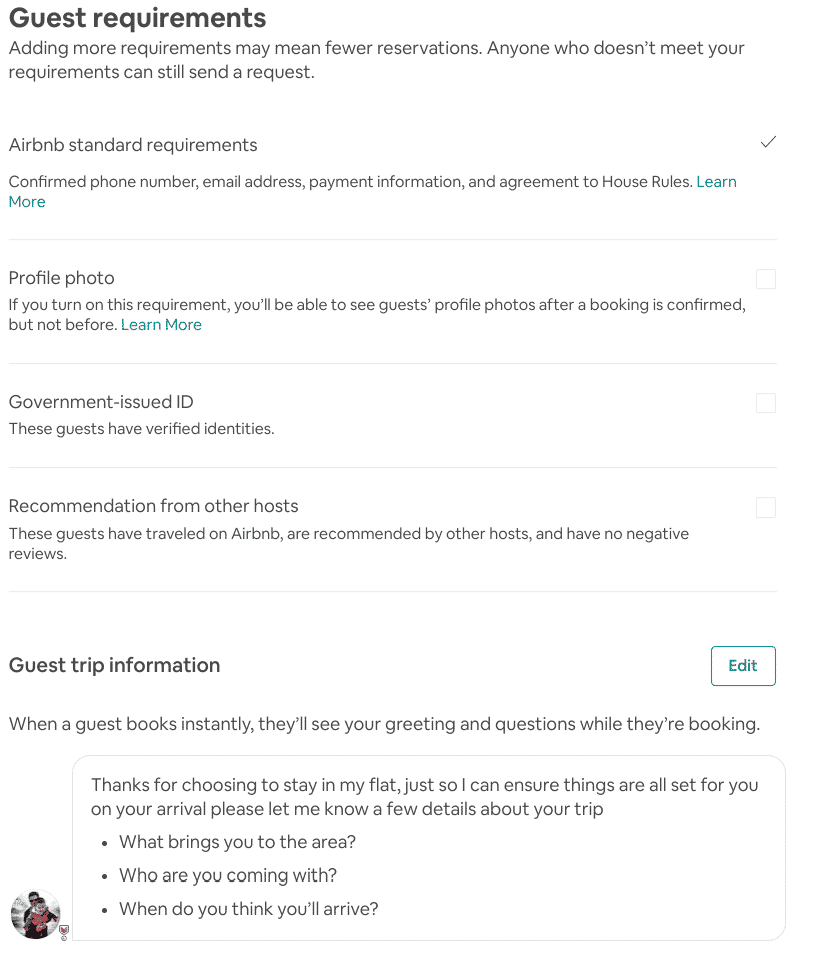
A guest who meets your chosen requirement(s) will be able to book your property (if the instant booking is ON) or send a booking request.
In the last option under ‘Guest trip information,’ you can ask your own set of questions, and the guest must answer them before booking or sending his request to book.
➤ More options you choose, less number of guests will meet that criteria resulting in fewer bookings.
➤ If you are listing a shared space in your home, I recommend checking all the boxes.
Pro Tip: The best option is to choose a ‘Government Issued ID’ – A guest has to upload an official document, and Airbnb asks them to take a live photo from their phone or laptop browser to match the two. It is the most reliable verification method to ensure you from frauds.
The rest of the two options, i.e. Photo-ID and ‘Recommended by other hosts’ can be manipulated by the guests if they want to and don’t necessarily protect you a great deal.
9. How does Airbnb work: Almost every guest will ask for early check in and late checkout.
Under the ‘Booking Settings’ page of your Airbnb listing, you will find ‘Policies’ at the bottom of the page where you can set Check in and Checkout times for your property.
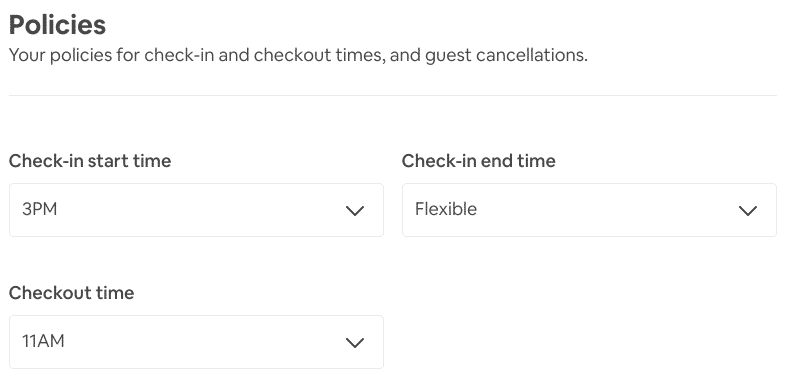
Check in – I recommend setting Check-in start time to no later than 3 p.m.
If you set it too late, it’s inconvenient for people who will lead to fewer bookings and almost everyone will ask for an early check-in, which you can deny obviously. Still, it leads to a lot of avoidable communication.
Checkout is determined by the time it takes you to clean and set up the property for the next guest. I recommend not to set it earlier than 10 a.m. because that’s too early for people to finish the morning chores and be out of the property, and you will get almost everyone asking for late checkout.
Business travellers usually arrive in the evening and check out early, so if you are in an area with a majority of the guests on a business trip, your life will be much easier.
Tourist guests, however, travel overnight and usually arrive early in the morning and take an evening flight back (as they are comparatively cheaper).
In my experience, 90% of tourist guest in Edinburgh ask for early check-in and late checkout. And it can be very annoying.
Pro Tip: For Guests asking for early check-in, let them drop the luggage anytime after the previous guest leaves (checkout time) and ask them to come back after the check-in time while housekeeping prepares the property for them.
For late checkout requests, ask them to leave the luggage behind and let them come back and pick it up before the next guest arrives (i.e. check-in time).
Strictly ask them not to use the facilities in the property when they come back to pick up the luggage. They will try to use the toilet and grab a glass of water before they finally depart, so be aware.
NEVER let the previous guest check out late, and the next guest checks in early on the same day and always give priority to the incoming guest.
It’s perfectly okay to decline early check-in/late checkout requests if you don’t want the hassle.
10. Airbnb can kick you off the platform anytime
- Never try to take offline payments from the guests for extending the stay, or book outside the platform.
- Don’t ever use abusive or discriminating language (racial, religious, gender, sexual orientation, etc.) with the guest.
Airbnb is inexplicably strict with these two principles – if the guest reports or if they find out themselves, you will wake up one day with no access to your account.
And no matter how many calls you make to the customer services or who you speak to, Airbnb will not share the details of the case, and you will be banned without any justification – and you cannot do anything about it!
If you make a mistake, be proactive, contact Airbnb customer services and explain it to the customer services, they will listen and hopefully do something about it, and it sometimes works on Airbnb.
And this brings us to first 10 most important learnings about how does Airbnb work but soon you will realise this business has so many aspects to it..so keep reading next points.
11. If you store personal items in the property, guests will poke them.
Keep your personal belongings locked or away from reach.
If you have expensive decorative items in the property, mention it in the house rules asking the guest to be careful and remind them again in the check in instructions, and if they are precious, you can even think of not allowing younger kids in the property as they are more likely to cause damage.
You can set this under the house rules sections of ‘booking settings’ on your listing.
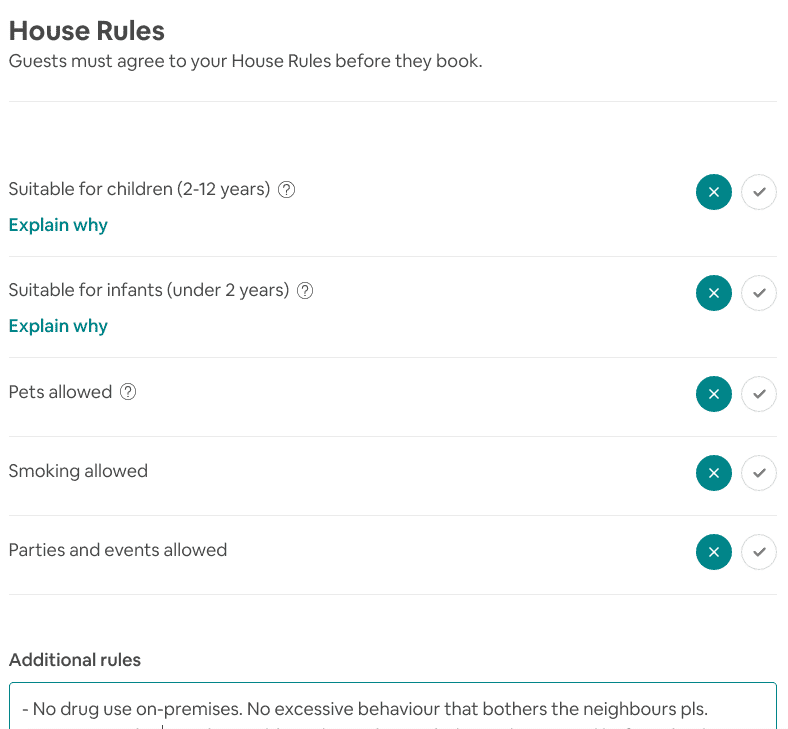
You can write the reason under ‘Explain why’ option under the children option. Alongside, you can write ‘Additional rules’ about your property, which Airbnb will force the guest to see and accept before they can send you a booking request or book your property.
12. A guest may try to take advantage if you are extra sweet, so learn to say 'No'.
This is hospitality business, although you have to be nice to the guest, sooner you will learn when to say ‘No’ to a guest for unreasonable request – the easier will be your hosting experience.
Saying ‘Yes’ to everything doesn’t always convert to 5-star reviews – same way saying ‘No to unreasonable demands’ doesn’t always get you a 4-star review.
Nicely explain the reason for declining the request, and people generally do understand your perspective.
13. Don't communicate with guests outside Airbnb unless it's an emergency.
Always communicate with guests via Airbnb messenger…although once the booking is confirmed both host and guest can see each other’s phone number but try to use the phone only for emergencies.
If the guest messages or calls you outside Airbnb, always write on the Airbnb message thread about any decisions, changes and essential pieces of information…it will give you another layer of protection if you need to deal with any problem.
14. Try not to fall for the rookie trap of providing extras like wine, transport, etc.
Providing extras is a double-edged sword.
I started with this ‘seemingly logical’ way to woo the guests by providing complimentary wine and an Airbnb guest welcome book on arrival. Still, it didn’t take me long to realise that it wasn’t worth the effort and cost – every guest was consuming it all but no mention of it in the reviews, and they will still be ruthless when complaining about issues.
I recommend not to stock the kitchen with food other than coffee, tea, basic spices and something like olive oil.
The rest is up to them! You can let the guests stock it up eventually…remember your focus should be providing a clean and safe place to live, not offering meals.
If you do, you’ll have a hard time dealing with unreasonable requests, and it will eventually eat into your profits.
16. Minimise communication from Day-1.
If you want to avoid being hassled by the guests in the middle of the night asking how to use the stove or the shower – the trick is to make everything ‘idiot proof’ by sticking labels on appliances with simple step-by-step user instructions.
Most important items (if you provide) to stick instructions to, are : Washing Machine, Dryer, Dishwasher, Heating/AC Control, TV, WiFi details and Shower.
16. Keep a secret key somewhere close to the entry.
Don’t expect this to happen often, but the guests are likely to lose the key or lock themselves out, and if you aren’t close by at that time, then it will be a tremendous pain dealing with the situation.
I suggest keeping a secret key somewhere near the property, ideally in a lockbox, so that you can guide the guest to fetch it from there. Share the key location only in case of such emergencies.
17. Keep extra supplies in a storage with a combination lock on it.
Your guests are likely to run out of supplies such as toilet rolls, washing up liquid, an extra towel or cleaning material – and such stuff can be missed easily during the turnovers.
I suggest keeping a storage cabinet within the property with extra supplies and a combination lock on it. So, when a guest messages you asking for additional supplies, you can point them to the storage cupboard and share the lock code.
If you don’t live close by – this tip will save you countless avoidable trips to the property, and increase guest satisfaction many folds when such a situation arises.
18. How does Airbnb work: Suggest 3rd party services but don't arrange it.
You can share local recommendations such as restaurants, places to see or a supermarket by creating an Airbnb guidebook and assign it to your property.
Very frequently, a guest will ask you for local help such as Airport pick up, schedule an appointment with a hairdresser, flower decoration or arrange a guide for local sightseeing.
The most important thing to keep in mind is that you are providing an accommodation without a concierge service – unless you want to.
You want the guest to review simply the quality of your accommodation, and it should not include the performance of the hairdresser or efficiency of the taxi driver you arranged for them.
Suggest a few options when asked but let them choose and book their appointments.
19. How does Airbnb work: Your biggest enemy can be the 'Amazing' photos of your property.
Listings with better photos get more bookings, but getting those professional shots by the best real estate photographer in town can harm your business in the long term.
Hospitality is all about ‘under promise and over deliver’ – there is a fine line between welcoming/warm photos and stunningly beautiful photos. You don’t want a guest coming with sky-high expectations, which will eventually result in disappointment reflected in the reviews.
You can use your phone to take beautiful photos of your property. If you prefer to hire a professional, don’t hire the best and the most expensive real estate photographer in town.
Here are the Airbnb tips for taking great photos of a property.
20. How does Airbnb work: The amenities you provide decide the kind of guest you will get.
A private bathroom is the most sought after amenity on Airbnb, and private entry to the property is highly desirable, but not a must-have.
The type of amenities you provide along with the room layout decides the kind of bookings your property will attract.
For example:
- Single beds attract single travellers or a group of singles if you have multiple single beds.
- A double bed and two single beds will attract families with young children.
- Double bed in each room will attract couples.
- Baby cot and high chair will attract travellers with small children.
- Working desk and high-speed internet paired with self-check-in will get you more business travellers.
It saves me a lot of hassle and time so I can focus on other aspects of preparing the property for my first guest.
21. How does Airbnb work: If you have sensitive neighbours, inform your guests well in advance.
Airbnb gets a lot of negative publicity due to anti-social behaviour by travellers. A vast majority of Airbnbs are individual units in residential blocks, and it can cause a great inconvenience to other residents.
If your property is in a residential area, be a responsible host and warn your guests, before booking and before arrival (twice) about the inconvenience they may cause to other residents.
You can add a message like this under the ‘House Rules’ section in booking settings of your listing. Airbnb gets explicit consent from the guest before they can book your property.

Along with this, I prefer to remind the guest a day before guest arrival with this message:
** Please may I request you to be very quiet on the stairs and in the flat after 8 p.m. A few ignorant guests in the past have upset my neighbours. Sorry! Sound travels very easily in the building, and lots of families with kids live in the flats.**
These two steps should considerably reduce neighbour complaints and show positively on you as a responsible host.
Airbnb has launched Neighbours tool for other residents in the area to complain about noise, parking, trash, common areas or something else related to a nearby Airbnb property.
22. How does Airbnb work: Keep your property insect and rodent-free.
Take all precautionary measures to stop an infestation (such as Airbnb bed bugs) in your property.
If guest complaints of insects or rodents – Airbnb takes it very seriously and won’t think twice to relocate the guest immediately and cancel your payout.
It will appear in your property reviews too and can severely deteriorate the performance of your property.
I hope this answers some key questions about how does Airbnb work and it will help you have smoother start to your Airbnb journey.
Find out what is Airbnb plus in my next Airbnb blog post.
Become an Airbnb affiliate.






